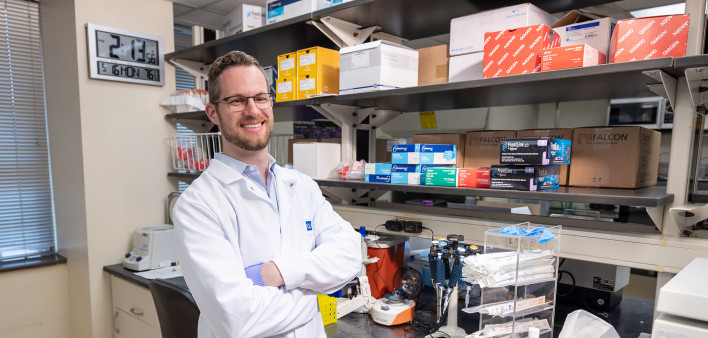What if scientists could genetically engineer a person’s immune cells so they would identify and attack HIV-infected cells, thus eliminating the virus from the body? That’s the hope behind chimeric antigen T-cell therapy, better known as CAR-T therapy.
A type of immunotherapy, CAR-T therapy is already transforming certain cancer treatments, and researchers are exploring how to apply the method to HIV therapy.
One such researcher is Daniel Claiborne, PhD, an immunologist at The Wistar Institute in Philadelphia. His efforts to effectively reengineer CAR-T cells to attack HIV show enough promise that he received a $65,000 grant from The Campbell Foundation, which funds private nonprofit HIV research.
“Dr. Claiborne submitted an ambitious project proposal of high relevance,” noted a member of the Campbell peer review board in a press statement. “The proposal is based on robust preliminary work and vast experience with the proposed methods and topics. I believe based on preliminary work and expertise of the lab, the chance to generate data relevant to research on CAR-T cells as a therapeutic intervention in HIV is quite high.”
The review board voted unanimously to award the grant.
“Recent advances in the field of genetic engineering have allowed for the creation of T cells that overcome many of the escape mechanisms of viral infections and cancers,” explained Claiborne, of Wistar’s Vaccine & Immunology Center. “In this approach, the T cell is redirected to target a specific cell type, in this case: an HIV-infected cell. Additionally, other signals can be added during the engineering process to make the T cells more potent and to give them different functions relevant to the disease we intend to treat.”
Unlike types of immunotherapy that entail a regimen of pills to help a person’s immune system fight disease, CAR-T therapy is strenuous and taxing. For example, when used to treat blood cancers, it involves taking a sample of the patient’s T cells and genetically altering them. But before infusing them back into the body, the patient’s existing immune cells have to be wiped out through chemotherapy.
In a promising note, a collection of studies have shown that the process is safe and effective in treating non-Hodgkin lymphoma among people with HIV (people living with HIV are at higher risk for this type of blood cancer).
In related research news, see “Cancer Immunotherapy Is Safe and Effective for People With HIV,” an article that explores checkpoint inhibitors, CAR-T therapy and stem cell transplants.
Founded in 1995 and headquartered in Fort Lauderdale, Florida, The Campbell Foundation has awarded over $12 million to HIV research and related causes.







Comments
Comments